First words and little sentences: 1 to 2 years
You are the most interesting thing in your child's world. When you pay attention to what they’re curious about, it opens up so many chances to chat together.
Everyday moments like cooking, playing and having fun help your child to learn new words, put sentences together, and practise having conversations.
These are important skills that support your child's well-being and help them with learning and making friends.
Video: Sing songs and rhymes together
Singing songs and rhymes is a fun way to introduce your child to new words and sounds and to get them active too!
Activities for your daily routine
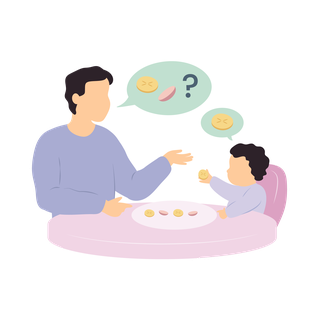
Mealtimes
Chatting with your child about what you're doing while cooking or eating together is a great way for them to hear new words.
Use their senses
You can make it fun by using all their senses!
- See: "Look, these grapes are green".
- Taste: "This yoghurt is sweet".
- Feel: "This banana is squishy",
- Smell: "Mmm, that curry smells delicious!".
- Hear: "Listen to these cornflakes – crunch, crunch, crunch!".
Get them involved
If it's safe to do so, let your child help when you're making meals or snacks.
Give them safe cutlery, like a blunt plastic knife for slicing a banana or a spoon for mixing dried fruit.
Talk about what you're both doing, like "cutting", "stirring", or "pouring". Introduce describing words like "crispy", "cold", "sweet", or "yummy" to help to build their vocabulary while you spend time together.
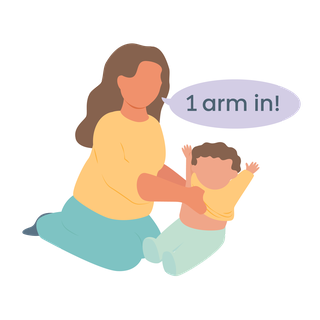
Getting dressed
Chatting about your daily routine, like getting dressed, is a great way for your child to hear the same words every day.
This helps them to start matching words they hear to things and actions.
Make it a game
You can turn this into a fun game: put the day's clothes in a cloth bag or pillowcase, then take turns pulling them out.
Build up the excitement: "It's a... t-shirt!". You can add fun details like, "It's your blue t-shirt" and where it goes, "It goes over your head!". Encourage them to have a go at finding something in the bag too!
Talk through the routine
As you get them dressed, use simple phrases or sentences to describe what's happening: "1 arm in, 2 arms in", as you help with their t-shirt. This keeps it fun and helps them to learn the words for different body parts.
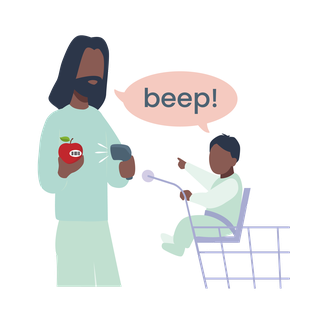
Out and about
Listening to the world around you when you're out and about is a fun way to help your child focus on different sounds.
Whether you're at the bus stop, the supermarket, or the park, there's always something interesting to hear.
For example, at the bus stop, you might hear a car go "vroom vroom". In the supermarket, you might hear the till go "beep beep". At the park, it could be the birds singing "cheep cheep". Make the sounds and see if your child joins in with you.
Follow your child's lead
Your child might point or turn their head towards a sound they've noticed. Follow their gaze and talk about it with them. It’s a great way to connect and build their listening skills.
Video: Talk about the sounds around you
Watch a dad make and respond to sounds and noises his child makes. Repeating them back to your child helps them to hear and recognise sounds.
Tiny Happy People
The BBC’s Tiny Happy People website offers simple, expert-backed ideas and activities to support your child’s language and communication skills from pregnancy through their early years.
The tips are easy to add to your daily routine, quick, inspiring, and proven to help your child thrive.
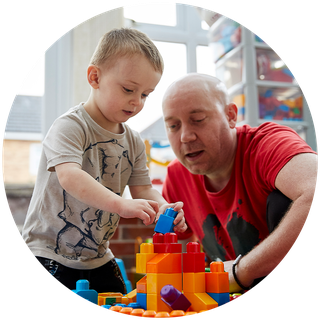
Little tips for everyday play
Libraries are a free way to access age appropriate books. Some also run story time sessions for parents and their children. Find your local library service on gov.uk.
Your local council may offer activities too. Find learning activities for your child on gov.uk.
Family Hubs
Family Hubs offer support to children, young people and their families. They provide a single place to go for support and information from a variety of organisations, making it easier to get the support you need.
They can provide guidance on issues such as feeding your baby or toddler, mental health and parenting support.
Family Hubs are currently operating in 75 local authorities across England.
Learning more than 1 language
It's important to chat with your child in the language or languages you speak at home. For tips on how to do this, check out the National Literacy Trust website.
Help and advice
Your child may not have any routine developmental reviews during the age of 1 to 2. If you feel your child needs a little extra support, your health visitor can help. They may put you in touch with a speech and language therapy team, or give you details of local activities.
If your child is going to nursery or another early years setting, staff will be able to help keep track of your child's development. Some children are eligible for free nursery places at 2 years old. Ask your health visitor for more information.
Ask your health visitor for more support whenever you need it, they will be able to provide tips and advice.
Remember, children learn to talk at different ages. If you are worried, speak to your health visitor or nursery key worker, or contact your local speech and language therapy service for advice.
For more ideas on how you can help your child, visit:
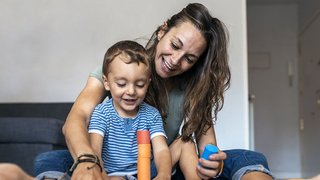
Early learning and development
90% of your child's brain growth takes place before they turn 5. Discover more advice and activities for ages 0 to 5 to help you make the most of every moment.
